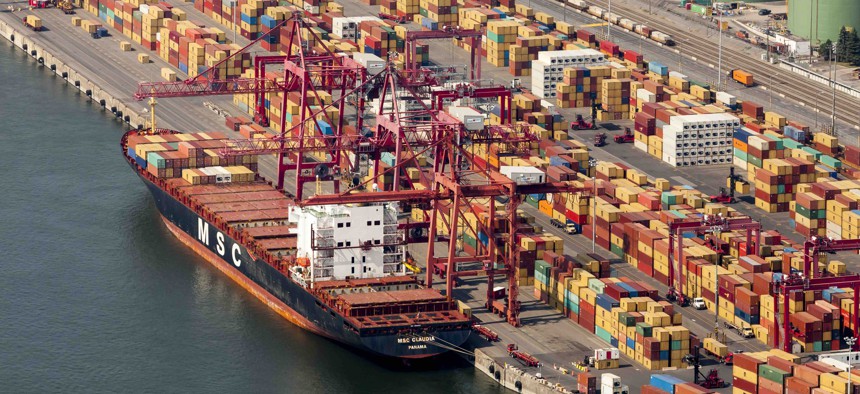Moody's Highlights States Most Vulnerable to NAFTA Exit

A docked container ship at the Port of Montreal, in Canada, during 2015. shutterstock
Talks are ongoing between the U.S., Canada and Mexico over the future of the trade deal, which President Trump has criticized.
Michigan, Texas, Vermont and North Dakota are the states that could face the greatest economic fallout if the U.S. were to abandon the North American Free Trade Agreement, according to a new report from a credit rating agency.
The Trump administration is currently pushing for a revamp of the trilateral trade pact between the U.S., Canada and Mexico and the president has threatened scrapping it if the talks don't yield the sorts of changes he's seeking. Moody's Investors Service says in a brief issued Thursday that the risks to the NAFTA renegotiation are rising.
NAFTA went into effect in 1994. Trade in goods between the U.S., Canada and Mexico was upwards of $1 trillion in 2016.
In Michigan, Texas, Vermont and North Dakota, the Moody's brief notes, NAFTA-related trade accounts for over 10 percent of gross state product—a measure of economic activity.
That's compared to the U.S. as a whole, where trade with NAFTA partners is about 5.8 percent of gross domestic product.
Michigan is the state that is most dependent on NAFTA-related trade, according to Moody's.
And Detroit, the ratings agency says, would be particularly vulnerable to a shake-up in trade relations with Canada and Mexico because automakers there import auto parts and export finished cars.
North Dakota mainly exports oil and gas to NAFTA nations. For Texas and Vermont, computer and electronics products are top exports to Canada and Mexico. In Texas, chemicals are a leading export as well.
Moody's notes: "Trade-dependent states and local governments would likely see declines in income tax and sales tax revenue in the event NAFTA is terminated, although the severity of the impact would depend on how high tariffs are and how long they are kept in place."
The ratings agency also points out that Texas' economy and export base are more diversified compared to the other three states, which could provide some protection from any NAFTA backlash. And that, compared to Texas and North Dakota, Michigan and Vermont have lower budget reserves to help them withstand economic turbulence.
Reuters reported Tuesday that the next round of NAFTA negotiations is tentatively scheduled for April 8 in Washington. Negotiators completed a seventh round of talks earlier this month.
President Trump stressed the importance of quickly concluding the NAFTA negotiations during a call this week with Canadian Prime Minister Justin Trudeau, according to a White House summary of the conversation. The U.S., Canada and Mexico started renegotiating NAFTA last August.
Trump has for now exempted Canada and Mexico from aluminum and steel tariffs he authorized last week. But he indicated that maintaining the exemptions could depend on how NAFTA talks play out.
Last week, during remarks at the White House, the president said if there is no deal on NAFTA, he would "terminate" the trade pact.
"And that will be the end of it," he added.
Trump won North Dakota and Texas by comfortable margins in the 2016 presidential election. In Michigan, he defeated Democrat Hillary Clinton by only a fraction of a percentage point. He lost in Vermont.
A Fitch Ratings Inc. report last year mirrored Moody's findings and said Michigan was the state with the most to lose if NAFTA is drastically overhauled or if the U.S. exits the deal.
While visiting Washington last month, the Republican governors of Michigan and North Dakota voiced concerns about the prospect of NAFTA falling apart, as Route Fifty reported at the time. But the governors also said the agreement could benefit from updates.
Bill Lucia is a Senior Reporter for Government Executive's Route Fifty and is based in Washington, D.C.
NEXT STORY: Next Recession Could Leave New York’s MTA ‘Particularly Vulnerable’






